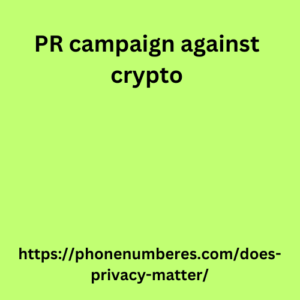How Do Telemarketers Get My Phone Number?
The incessant ringing of your phone, only to be greeted by an automated telemarketer, is a frustratingly common experience. But how do these unsolicited callers obtain your personal number? Understanding the tactics used by telemarketers can empower you to take steps to protect your privacy.
H2: Data Brokers: The Middlemen of Personal Information
One of the primary methods telemarketers PR campaign against crypto employ to acquire phone numbers is through the purchase of data from third-party data brokers. These companies accumulate vast amounts of personal information, including phone numbers, from various sources.
- Online Activities: Your digital footprint, encompassing website visits, app usage, and social media interactions, is meticulously tracke and compile into data profiles. These profiles are subsequently sold to telemarketers for targeted marketing campaigns.
- Public Records: Information accessible through public records, such as voter registration, property ownership, and business licenses, is also a valuable commodity for data brokers.
- Warranty Cards and Surveys: Submitting warranty cards or participating in surveys can inadvertently provide telemarketers with your contact information.
H2: Other Acquisition Methods
Beyond the purchase of data, telemarketers utilize various tactics to expand their contact lists:
- Robocalls and Random Dialing: Automate systems generate phone numbers randomly or sequentially, hoping to connect with potential customers. While often ineffective, this method can still generate a significant volume of unwante calls.
- Caller ID Spoofing: To appear legitimate, telemarketers may disguise their caller ID to mimic trusted organizations or individuals. This deceptive practice can trick unsuspecting recipients into answering the call.
By understanding how telemarketers acquire phone numbers, you can implement strategies to minimize unwante calls, such as registering for the National Do Not Call Registry, being cautious with personal information, and utilizing call-blocking features.
How Do Telemarketers Get My Phone Number?
The relentless barrage of telemarketing calls has become a pervasive annoyance in the digital age. But how do these unsolicited callers obtain your personal number? Understanding the tactics used by telemarketers can empower you to take steps to protect your privacy.
H2: Data Brokers: The Middlemen of Personal Information
One of the primary methods telemarketers employ to acquire phone numbers is through the purchase of data from third-party data brokers. These companies accumulate vast amounts of personal information, including phone numbers, from various sources.
- Online Activities: Your digital footprint, encompassing website visits, app usage, and social media interactions. Is meticulously tracke and compile into data profiles. These profile are subsequently sold to telemarketers for targete marketing campaigns.
- Public Records: Information accessible through public records, such as voter registration, property ownership, and business licens, is also a valuable commodity for data brokers.
- Warranty Cards and Surveys: Submitting warranty cards or participating in surveys can inadvertently provide telemarketers with your contact information.
- Loyalty Programs and Rewards: Joining loyalty programs or accumulating rewards points often involves sharing personal information, which can be use for marketing purposes, including the sale of phone numbers to telemarketers.
- Mobile Apps: Many free apps collect user data, including phone numbers, which can be share with third parties for advertising and marketing purpos.
H2: Other Acquisition Methods
Beyond the purchase of data, telemarketers utilize various tactics to expand their contact lists:
- Robocalls and Random Dialing: Automated systems generate phone numbers randomly or sequentially . Hoping to connect with potential customers. While often ineffective, this method can still generate a significant volume of unwante calls.
- Caller ID Spoofing: To appear legitimate, telemarketers disguise their caller ID to mimic trusted organizations or individuals. This deceptive practice can trick unsuspecting recipients into answering the call.
- Data Breaches: Unfortunately, data r breache at companies can expose customer information, including phone numbers, to malicious actors who may sell this data to telemarketers.
- Referrals and Word-of-Mouth: While less common, telemarketers may sometimes obtain phone numbers through referrals from satisfie customers or by exploiting social networks.
- Sim Swapping: This sophisticate scam involve hijacking a phone number by tricking a carrier into transferring the number to a new SIM card controlle by the scammer. While primarily used for financial fraud, it can also lead to telemarketing harassment.
- Phone Number Harvesting: Some websites or apps may collect phone numbers without explicit consent, often through deceptive practice or hidden terms and conditions.
By understanding how telemarketers acquire how to write a follow up email phone numbers and implementing strategi like registering for the National.






